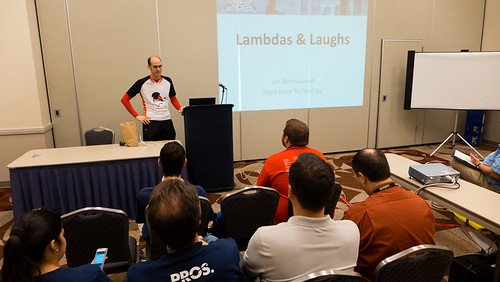We recently held a panel titled “Software development is a team sport: Women In Technology” at Houston TechFest in Houston and Austin CodeCamp in Austin, Texas. The goal was to have a conversation about men and women working together in IT and software development industry. Research shows that we are more productive because of our differences, not in spite of our differences, when we manage to work together. We had great participation: men and women shared stories, concerns from their experience, concerns they have for their daughters, difficult situations and techniques that worked in different environments.
Each time, there surfaced an old-time objection to hiring women:
- Why hire a woman, who may get pregnant and go on leave for weeks, and then perhaps be somewhat distracted for a few more months, when one can perfectly well hire a man, who is not in any danger of ever bearing a child?
This entire line of reasoning strikes me as odd.
Fertility rate in the US is 1.9 children per woman, i.e. over a lifetime an average woman is expected to have 1.9 kids. Women with more education tend to have fewer children, so for women with a college degree the average is just 1.1 children.
A college graduate typically has a 45+ year career, male or female, first entering the workforce at age 22 and working at least until his or her late 60s. Today’s typical tenure in IT at a given position, job or company is 2-5 years.
So, a woman interviewing for a job today, has an approximately 2-in-45 chance to have a child while working at this job. If she already has a child, that chance falls to 2-in-450.
In order to get this interview, this woman has shown herself to be a stronger candidate than, typically, 2 to 100+ other people, who also applied for this position. She still has to beat 2+ other candidates, also invited to interview for this position. Overall, her chances of becoming the top candidate are between 1-in-4 and 1-in-100, which makes her (or anyone reaching that point) quite awesome!
Now, consider another angle. Productivity among mediocre, good and great developers varies by orders of magnitude. Hiring the best person for the team makes a significant difference in bottom-line productivity, quality, time-to-market and maintainability of the project. A woman who is x10 as productive as the next candidate, even if she takes 2-4 months (over her 2–5 year tenure in a particular job) to take care of her family, is still a net win for the team with a realized productivity gain of 90%+. And this is the worst-case scenario! In a typical case, your best candidate will deliver an even better value, regardless of her gender.
The argument about women's propensity to take time off to have children makes no sense in the context of hiring the best person for a software development job. Any organization's best bet is to identify and hire the best person they can get, and then make sure that person stays with them as long as possible. Regardless of their gender.


No comments:
Post a Comment